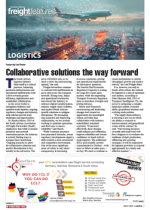The South African logistics industry finds itself at a critical juncture, balancing persistent infrastructure and operational inefficiencies with a drive towards greater efficiency, digitalisation and stakeholder collaboration. As the sector works to strengthen resilience and optimise trade logistics, ongoing regulatory changes and industry-wide reforms provide both challenges and opportunities.Dr Juanita Maree, CEO of the South African Association of Freight Forwarders (Saaff ), emphasises that while economic pressures and network constraints persist, the industry is actively finding ways to navigate these headwinds. “Ongoing maturity to allow for collaborative solutions and market liberalisation is key, notably in the rail sector. The ports will follow suit, as we need to drive the restructuring agenda,” she said.Freight forwarders continue to contend with inefficiencies at ports and across the transport network. Rising costs, delays and operational bottlenecks have forced the industry to embrace digital transformation, enhance supply chain visibility, and explore South African-specific solutions to mitigate disruptions. “By leveraging data analytics and improving collaboration, we are actively working to optimise operations and find ways to ensure reliability,” said Maree.While economic pressures have presented obstacles, recent regulatory developments signal a shift towards a more structured and competitive environment. One of the most significant areas of reform is rail, where transparency is increasing in access conditions, pricing and operational requirements for third-party operators. The Interim Rail Economic Regulatory Capacity is setting the stage for a more open market, while the impending Transport Economic Regulator aims to introduce oversight and pricing fairness. Maree said Transnet’s restructuring and leadership changes had created an opportunity for meaningful reform, provided that collaboration with industry stakeholders remained a priority. “If executed effectively, these changes could enhance port efficiency, improve reliability and restore confidence in South Africa’s trade logistics. The additional RTGs and straddle carriers commissioned in Durban – with more to follow at other ports – are key. We need to continue to create mechanisms to unlock throughput growth and market reform,” she told Freight News.It is, however, not only in South Africa where the outlook for logistics is a mix of optimism and caution. According to John Manners-Bell, CEO of Transport Intelligence (Ti), the sector is navigating a complex landscape amidst economic shifts, geopolitical tensions and evolving trade policies.“The supply chain industry is entering a new era in which the ability to respond to macroeconomic and geopolitical events will be critical,” he said. “The looming prospect of tariffs and trade wars will force shippers to re-evaluate the resilience of their production, offshoring and sourcing strategies. It will be imperative for logistics providers to respond appropriately in a timely and effective manner.” LV

